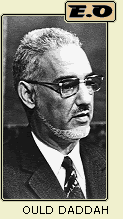Colonialism With a French Accent
It’s easy to forget France’s colonial past. Let’s not.
Moktar Ould Daddah, 78, Who Led Mauritania to Independence in 1961, Dies
By AGENCE FRANCE-PRESSE

NOUAKCHOTT, Mauritania, Oct. 15 – Moktar Ould Daddah, who led Mauritania to independence, died Tuesday in a Paris hospital, his family announced here on Wednesday. He was 78 and had been in the hospital for several weeks.
Mr. Ould Daddah became Mauritania’s first president in 1961 and was re-elected three times, governing 17 years before being ousted in a coup in 1978.
Born on Dec. 25, 1924, into a family of Muslim religious leaders, Mr. Ould Daddah studied and married in France.
From his first political post at 33, when he was elected regional councilor for the central region of Adrar, he rose quickly in Mauritanian politics, becoming vice president of the governing Executive Council the same year and president the next.
Mr. Ould Daddah campaigned for a “yes” vote on preserving some ties with France in a referendum in 1958, two years before independence. Nine months later he was elected the first president of the Islamic Republic of Mauritania.
He was also in the conflict over Western Sahara after he signed a deal dividing the mineral-rich area between Morocco and Mauritania in 1975. That accord backfired on Mr. Ould Daddah when Western Sahara separatists, the Polisario Front, battled troops loyal to Nouakchott for independence.
In 1977, Mr. Ould Daddah’s government had to call on the French military to intervene against Polisario.
In 1978, the human and financial costs of the war, combined with a severe drought and a drop in world demand for iron ore, Mauritania’s main foreign-exchange earner, brought on the military coup that forced Mr. Ould Daddah from power.
He went to France in 1979 for medical treatment and spent most of his later years in exile, returning home in 2001 saying he wanted to serve as “an arbiter, someone to turn to for resolving problems.”
